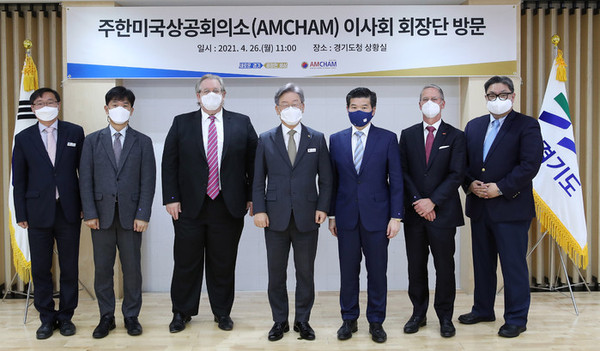Who will win the Presidential election next March?
Who is going to take over the government of incumbent President Moon Jae-in? At present, the front runner is former Attorney General Yoon Suk-yeol followed closely by Governor Lee Jae-myung of the Gyeonggi Province and then by former Prime Minister Lee Nak-yeon who presently remains in a single digit figure support while his contenders are winning more than 30% each.
Korea has Presidential election coming on March 9 next year, which will decide the fate of the ruling political camp now headed by President Moon Jae-in.
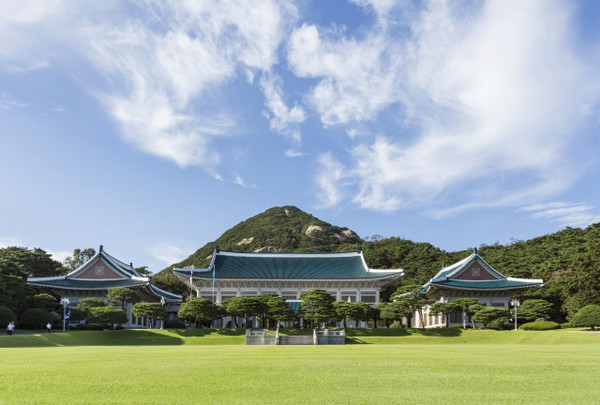
The latest polls on the Presidential hopefuls conducted by Real Meter on June 21-22, 2021 show Yoon leading the survey winning 32.3% of the votes followed by Governor Lee with 22.8% support. Former Chairman Lee N.Y. of the Democratic Party scored 8.4%.
However, things can change.
There are predictors who insist, “Well, finally the winner will be Mr. Lee Nak-yeon!”
Lee Nak-yeon has the full support of the ruling camp, as well as the best wishes of President Moon Jae-in himself.
All sorts of ‘negative attacks’ are heaved on the Presidential hopefuls and mud is slung against each other.
At this time, Lee Nak-yeon is way down at the chart of the Presidential hopefuls (8.4%), but, as was briefly mentioned afore, he has the full support of the followers of President Moon.
Things can change. And nobody knows at this time how the situation will change with the passage of time before the final day of showdown among the candidates.
Many people in Korea, especially those in the ruling camp and their sympathizers, put their stake on Lee Nak-yeon defying the current poor results of opinion polls.
As was briefly mentioned afore, the new Presidential election is slated for March 9 next year. The Democratic Party suffered a humiliating defeat in the Seoul mayoral election on April 7 and also in Busan, the second largest city in Korea.
The election results of Seoul and Busan came as a sheer reminder that the Korean people have now started reviewing their all-but unanimous support given to the incumbent ruling party in the last general elections.
The Korean people today are literally split between the traditionally conservative-oriented people and progressive-minded ones who now control the government and the ruling circles in the political arena.
In the last general elections in Korea, the voters gave a landslide victory to the progressively oriented Democratic Party over the conservative political circles.
Pundits say that the conservatives then were overly confident in the victory and nominated parliamentary candidates who had little competitivity compared with their rival party candidates. Over confidence on the part of the conservatives in their victory boomeranged and gave them a humiliating defeat.
As a result, the progressives led by President Moon in and the ruling party won a landslide victory, winning 189 seats out of the total 300. The conservative United Future Party (today’s main opposition People Power Party) won only 84 seats
The others (27 seats) are independently oriented ones and can take sides as they wish. The breakdown of the members of the incumbent National Assembly members is as follows:
Ruling camp:
Democratic Party of Korea: 163 seats
Together Citizens' Party: 17 seats
Open Democrats: 3 seats
Justice Party: 6 seats
Opposition party:
United Future Party: 84 seats
Independent parties:
Future Korea Party: 19 seats
People Party: 3 seats
Independent: 5 seats
Here is a brief account of the personal history each of the three major Presidential candidates based on information of Wikipedia:
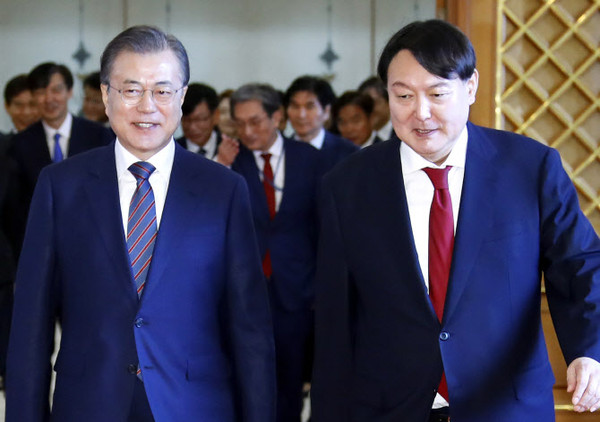
Yoon Suk-yeol (based on information on Wikipedia):
Yoon Suk-yeol (born on December 18, 1960) is a lawyer and a former Prosecutor General of South Korea.
Yoon Suk-yeol was born in Yeonhui-dong, Seodaemun District, Seoul in 1960. Some have suggested that he was from Honam, but it was reported as a rumor. His father, Yoon Ki-joong, is a retired educator Daegu graduated from Yonsei University and Hitotsubashi University who later established the Korean Statistical Society and is now a full member of the National Academy of Sciences of the Republic of Korea. His mother was born in Gangneung and was a lecturer at Ewha Womans University before leaving the position after her marriage.
Yoon attended Chungam High School and studied law at Seoul National University. He passed the first part of the bar exam in Year 4 of university but failed the second. He kept failing for the next nine years. The reasons for his failed attempts are not clear, but the main cause is widely regarded to be the mock trial he held against Chun Doo-hwan. He finally passed the bar in 1991 along with Park Beom-kye, a Democratic MP.
Yoon started his career at Daegu Public Prosecutor’s Office in 1994. He headed the Special Branch and Central Investigation Department, both of which investigate corruption-related cases. In 1999, he arrested Assistant Commissioner Park Hui-won, who was involved in a corruption in spite of strong objections from bureaucrats in the Kim Dae-jung cabinet.
In 2013, Yoon led a special investigation team that looked into the National Intelligence Service (NIS)'s involvement in the 2012 NIS public opinion manipulation scandal. Yoon sought the prosecution of the former head of the NIS, Won Sei-hoon for violating the Public Official Election Act. He accused Justice Minister Hwang Kyo-ahn of influencing his investigation. As a result, he was demoted from the Seoul prosecutors' office to the Daegu and Daejeon High Prosecutors' Office.
Yoon later became head of investigations in the special prosecutor team of Park Young-soo, which investigated allegations pertaining to the 2016 Choi Soon-sil scandal involving Choi, Samsung vice-chairman Lee Jae-yong and then-President Park Geun-hye, which led to the impeachment of the president in December 2016.
On 19 May 2017, the newly-elected President Moon Jae-in appointed Yoon as Chief of the Seoul Central District Prosecutors' Office. The prosecution indicted two former presidents Lee Myung-bak and Park Geun-hye, three former NIS chiefs, former chief justice Yang Sung-tae and more than 100 other former officials and business executives under his tenure. Yoon also led an investigation into accounting fraud at Samsung.
Prosecutor General
On 17 June 2019, Yoon was nominated as Prosecutor General, replacing Moon Moo-il.
Yoon led investigations against Minister of Justice Cho Kuk, who was involved in various scandals. His decision to prosecute was welcomed by the opposition but was condemned by the Democratic Party and its supporters.
After Choo Mi-ae was appointed the new Minister of Justice, she took an action against several prosecutors close to Yoon. Choo attributed her decision to Yoon's failure to submit a reorganization plan for his department, which she requested, but this was seen as retaliation by the Blue House for Cho Kuk's prosecution.
In April 2020, Democratic Party lawmakers again attacked Yoon and called on him to resign as the prosecution started investigations into election law violation cases involving both ruling and opposition politicians and also suspected election rigging of the Ulsan mayoral race for Mayor Song Cheol-ho in 2018 by senior secretaries at the Blue House.
On 4 March 2021, Yoon tendered his resignation, which was accepted by President Moon.
On 24 November 2020, Minister of Justice Choo Mi-ae suspended Yoon from his position, citing alleged ethical violations, abuse of power, and interference into investigations of his associates and family members. Yoon filed an injunction against the minister's suspension order, which was approved by the Seoul Administrative Court on December 1, temporarily halting the suspension. On December 16, the Ministry of Justice then imposed a two-month suspension on Yoon, accepting four of six major charges for disciplinary action. The decision was subsequently approved by President Moon. However, on December 24, following an injunction filed at the Seoul Administrative Court, the suspension was overturned as the court accepted Yoon's claim that the process to suspend him was unfair.
Political positions
Yoon identifies himself as "conservative", adding that he was inspired by economically liberal Milton Friedman. A former conservative MP, Chung Doo-un, has also considered Yoon a conservative.
Speculated potential run for presidency
He is considered a potential presidential candidate for the 2022 presidential election.
Yoon led a January 2021 poll as the most favored presidential candidate, with 30.4 percent of the vote, more than the support for the ruling Democratic Party's Lee Jae-myung and Lee Nak-yon.
Personal life
Yoon has been married to Kim Kun-hui since 2012. Kim Kun-hui is the President of Covana Contents, a company that specializes in art exhibitions.
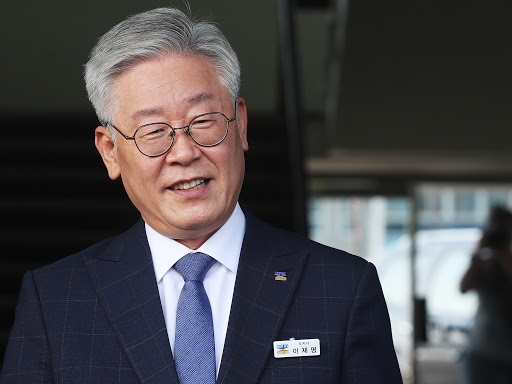
Lee Jae-myung (based on information on Wikipedia):
Lee Jae-myung, born on Dec. 22, 1964, is a South Korean politician and attorney who has been serving as Governor of Gyeonggi Province since 2018. Prior to this, he served as Mayor of Seongnam City, the tenth largest city in South Korea, from 2010 to 2018. He is a member of the ruling Democratic Party of President Moon Jae-in.
Born in Andong, Lee studied law at Chung-Ang University, and went on to work in that field before his entry into politics.
As Mayor of Seongnam, he gained recognition for creating Seongnam's social welfare program, widely regarded as one of the most comprehensive social welfare programs in the nation for the city's elderly citizens and youth. In addition, he is noted for his decision to ban dogmeat from the famous Moran Market, which had been the largest dogmeat market in South Korea since 1960.
While serving as Mayor, Lee ran unsuccessfully for President in the 2017 presidential election. Considered one of the three most important potential candidates in the run-up to the election, Lee received third place in the Democratic primary behind former party chair and National Assembly member (and eventual winner) Moon Jae-in and Ahn Hee-jung, the Governor of South Chungcheong Province. As a result of his left-wing populist views, he has been compared to American politician Bernie Sanders.
Following his loss in the Presidential election, Lee ran for Governor of Gyeonggi Province, which encompasses much of the Seoul Capital Area. Following his election, he faced legal issues stemming from an alleged violation of campaign rules that put his governorship into question. Lee has received acclaim for his response to the COVID-19 pandemic as Governor and is considered a top candidate in the 2022 South Korean Presidential election.
His special order for all foreigners working in Gyeonggi Province to be tested for COVID-19 was criticized by diplomatic envoys and non-Korean residents for being discriminatory. Seoul also announced similar policies but changed them to recommendation--actually withdrew them--after facing criticism. Nonetheless, Lee's special order went on mandating its 340,000 foreign workers to get tested - resulted in finding 329 new positive cases among them.
"Unanswered Questions," a famous investigative journalism television program run by Seoul Broadcasting System, aired an episode questioning the links between the local Mafia organization in Seongnam city and Lee and Eun Su-mi, the then mayor of the city.
Lee was accused of giving up "Happiness," the dog he adopted during his time as a mayor of the city, when moving into his new-residence as Gyeonggi provincial governor leaving the dog to Seongnam city hall. Lee explained that the dog was adopted by the city not by an individual and later re-adopted to a new family.
In February 2021, a year after the first Central Disaster and Safety Countermeasures Headquarters (CDSCH) meeting was held to tackle the COVID-19 pandemics, it was revealed that Lee only participated in its three of this meetings despite being virtual and critical given that Gyeonggi Province and Seoul account for majority of positive cases in the country. This was well below 68.5 the averaged number of CDSCH meetings Lee's fellow heads of provinces and metropolitan cities joined. In response to the criticisms rising from this, Lee said in April 2021 that he used his time effectively in addressing more critical issues and an hour of Gyeonggi provincial governor is 13.8 million hours (just like its population). Chung Sye-kyun who recently resigned from Prime Minister for his presidential campaign publicly shared his frustration that Lee would not have made such statement if he is well aware of government's efforts in contaminating the virus and vaccinating the public.
On Dec. 11, 2018, the prosecution indicted Gyeonggi Province Governor Lee Jae-myung, who was suspected of circulating false information under the Public Official Election Act of the Republic of Korea. His wife Kim Hye-kyung was not indicted, citing a lack of evidence. Two days before the expiration of the statute of limitations on the seventh election, the case against the couple was closed. After the police concluded that they believed the account belonged to Lee's spouse Kim, the case was transferred to and later struck down by the prosecution, citing a lack of evidence.
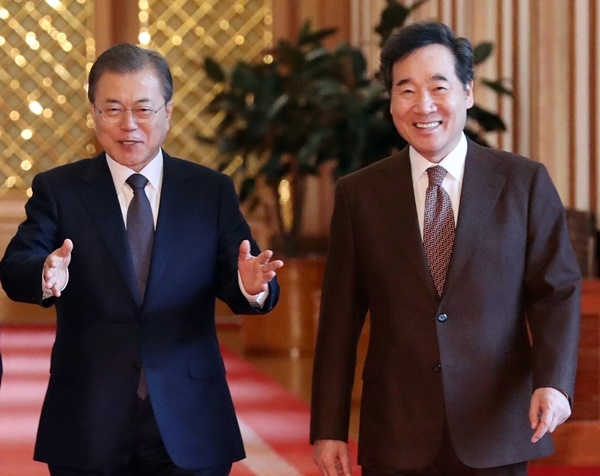
Lee Nak-yeon (based on information on Wikipedia):
Lee Nak-yeon, born on Dec. 20, 1951, is a South Korean politician who previously served as the 41st Prime Minister of South Korea. He is also the longest serving prime minister of South Korea since the Constitution of South Korea was last revised in 1987. He also served as the governor of Jeollanam-do (South Jeolla) province, a stronghold of his party. Before serving as governor, he worked as a journalist for over 20 years and served as a member of the National Assembly for four terms.
Lee was chosen for the position of Prime Minister by President Moon Jae-in to keep his campaign promise to appoint his de facto deputy from Honam region. During his tenure as Prime Minister, Lee became well-known for his forceful exchanges with opposition party leaders and adeptness at communicating with citizens. Prior to and following his victory in the crucial Jongno district in the 2020 legislative election against conservative Hwang Kyo-ahn, another probable presidential candidate, he has been said to be a favorite in the 2022 South Korean presidential election.
Lee was born on Dec. 20, 1951 in Yeonggwang County in South Jeolla Province. After graduating from Seoul National University with a degree in law, he shortly worked at investment trust. From the late 1970s to 2000, he worked as a journalist for the daily Dong-a Ilbo newspaper for 21 years. From 1989 to 1993, he was stationed in Tokyo as its correspondent during which he reported the inauguration of new Japanese monarch Akihito.
Lee entered politics in 2000 "based on his ties with former President Kim Dae-jung he formed while covering politics." Following his departure from the Dong-a Ilbo he was elected as a member of the National Assembly in 2000 and served for four terms. He also served as a spokesperson for former President Roh Moo-hyun when Roh was the president-elect in 2002. Roh chose Lee's draft speech for his presidential inauguration among multiple drafts and delivered the speech without changing a word Lee wrote. Lee was only one of two parliamentarians who voted against the impeachment of President Roh despite of different party membership. Lee is seen as having close ties with key Japanese politicians, having served many years as a senior member in the Korea-Japan Parliamentarians' Union. Lee speaks fluent Japanese.
He left office in the middle of his fourth term in 2014 to successfully run for governor of South Jeolla Province. Lee received around 60% approval rating throughout his term before leaving the office in May 2017. On his first day in office, President Moon nominated Lee as his first Prime Minister of South Korea right after his inaugural ceremony. Lee resigned from South Jeolla Provincial Governorship on the same day. Until Lee's nomination was confirmed by the parliament, Hwang Kyo-ahn, the last prime minister under impeached-and-removed President Park Geun-hye, kept his place. Lee referenced Makgeolli when emphasizing his intention to work with opposition parties and for the people.
On June 25, Prime Minister Lee urged North Korea to release their prisoners. On July 27, Prime Minister Lee Nak-yon, who is known to be knowledgeable about Japan, criticized the accord regarding ‘comfort women’. On Aug. 16, Lee reacted negatively to calls for South Korea to possess nuclear weapons, saying the move would undermine Seoul's calls for North Korea to denuclearize, trigger a nuclear arms race and put the country under international sanctions. Reflecting such calls, the main opposition Liberty Korea Party adopted a demand for the redeployment of US tactical nuclear arms as its official party line during a general meeting of its lawmakers. On Nov. 29, Lee raised concerns that crypto currencies were corrupting the youth of South Korea, remarking “There are cases in which young Koreans including students are jumping in to make quick money and virtual currencies are used in illegal activities like drug dealing or multi-level marketing for frauds”.
In 2020 election, Lee stood for Jongno constituency and defeated the UFP President Hwang Kyo-ahn. He took two roles in his party - co-chair of 2020 general election campaign with the other co-chair being then-party leader Lee Hae-chan and the chair of the committee "to overcome the national crisis" caused by Covid-19 pandemic. With the party leader Lee Hae-chan hospitalized, Lee traveled across the nation to support his party candidates and was regarded as the de facto commander of his party's campaign in the election. The party increased its share at the parliament to a level that it does not require other parties' votes for enacting the laws.
On March 9, 2021, exactly a year before the 2022 South Korean Presidential election, Lee resigned from the leader of his party triggering leadership by-election and effectively announcing his candidacy for president. He continued to lead party's campaign in local by-elections in April 2021. After the party's defeat in this election, all remaining members of the party leadership resigned. Lee announced he will have some time for self-reflection. After new leadership members were elected in May 2021, he met with representatives of SMEs and large corporations urging them to take part in solving youth unemployment and breaking his silence.
Lee is married with a son. Lee Nak-yon's family origin is the Jeonju Yi clan. He is also the 22nd-generation descendant of Grand Prince Wanpung who was the elder half-brother of King Taejo of the Joseon Dynasty, the founder of the Joseon Kingdom. He is a member of the South Korean Presbyterian Church.
